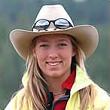Auditing a lesson or clinic
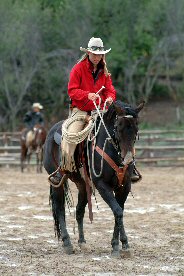 'Auditing' is the term we use for spectators at clinics, and this is one of the easiest, cheapest and most beneficial
ways to see what the Parelli Program is all about and make huge progress in your horsemanship.
'Auditing' is the term we use for spectators at clinics, and this is one of the easiest, cheapest and most beneficial
ways to see what the Parelli Program is all about and make huge progress in your horsemanship.
Fawn says, "The first time I attended a Parelli Clinic in Australia in '97 I was literally blown away by how much I took
away from that clinic. I had never learned that much participating in a clinic! Let alone just watching it. After that first
experience, I made sure that I was at every clinic in a five hour radius of me, whether it was for my Level, the one above
or the one below what I was currently studying. I found that the lower level clinics really cleaned up my understanding of
the basics (which helped me with my foundation) and the higher level clinics showed me where everything was leading and
helped to put a purpose behind some of the tasks that I was currently working on. As a result I was able to pass both my
Level 1 and 2 in well under a year! And I had loads of exercises to work on once I got back home to Canada and started
through the levels again with my own horses."
Every Instructor has a very unique teaching style and different exercises to teach the same concepts. Auditing
a clinic is a very good way to see your potential Instructors 'resume' in action! Does she clearly explain the exercises so
that you understand what to do? Does she explain why you are doing it and what you are hoping to achieve by it? Do you like
her teaching style and would you feel comfortable with her as your horsemanship coach?
There are often opportunities to audit a clinic for free in exchange for being a volunteer and helping the Clinic
Coordinator with equipment sales, lunch, check-in or advertising prior to the event. If you'd like to volunteer, contact
the coordinator for more information on signing up!
Participating
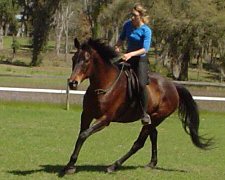 Although the Parelli Natural Horse.Man.Ship Program is
designed to function as a home study program, there are many instances when you have
questions that aren’t answered in the pages of the booklets. Attending a course
with a Licensed Instructor can give you a boost, be it
through reassurance, confidence in your techniques or overcoming any issues – they are here to help
you!
Although the Parelli Natural Horse.Man.Ship Program is
designed to function as a home study program, there are many instances when you have
questions that aren’t answered in the pages of the booklets. Attending a course
with a Licensed Instructor can give you a boost, be it
through reassurance, confidence in your techniques or overcoming any issues – they are here to help
you!
Workshops are a great way for students who are working on the same subject to get together with Fawn for task
specific coaching. Problem Solving clinics can cover anything from trailer loading, jumping, leads, impulsion, horses that don't like needles
or flyspray....the list is endless.
Clinics are a great way to measure progress and fastrack your levels
journey. You also get the chance to meet other students in your area, many of
whom form study groups to support each other as you're learning.
Fawn runs courses throughout the year in British Columbia, Ontario, across Canada and abroad. If you would like to know
more about the clinics Fawn offers, see 'What to Expect' or 'Calendar'.
What to expect
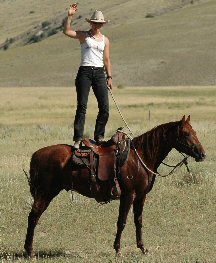 Clinics are
usually run for two or three days and you bring your own horse to them. They are
run in a variety of locations and are most often organized by a local host or
clinic coordinator. Most people travel quite far to come to a clinic so they
stable their horse at the venue and either camp or stay in a local Bed and Breakfast. Clinics
are designed to give you the principles and concepts that you will need for your
level.
Clinics are
usually run for two or three days and you bring your own horse to them. They are
run in a variety of locations and are most often organized by a local host or
clinic coordinator. Most people travel quite far to come to a clinic so they
stable their horse at the venue and either camp or stay in a local Bed and Breakfast. Clinics
are designed to give you the principles and concepts that you will need for your
level.
Please do not bring stallions or unstarted horses. To get the
most out of your clinic experience bring the most dependable horse you have. We
would also suggest that you get the Level kit (information & equipment)
before you come to the clinic. By no means is it a prerequisite to have these
things, but if you’ve had a chance to go over some of the theory and get
comfortable and co-ordinated with the equipment you will get much more out of
the clinic.
Clinics usually start at 9am and begin with an introduction
and theory session without horses. This gives you the chance to meet everyone
else in the class and to talk to Fawn about your horse and what objectives you
have while in the clinic. It also gives you a chance to soak up some of the
theory in a relaxed friendly environment before trying it out with your horse.
The next part of the clinic is dependant on the level of the class but
will begin online. Lower levels will be taught online until lunch. Higher levels
may ride.
Lunch is at approx 12noon and lasts for an hour and a half.
The afternoon session will again depend on the level of the clinic but
for level two and above it usually involves riding. The course will finish for
the day at approx 4:30pm.
The evening is your own, however there is
usually something going on to get involved in if you ask. At some clinics, Fawn
joins the students for a meal or B.B.Q or does a short inspirational
demonstration with one of her horses. At others the students get together
themselves for a drink or dinner etc... The main thing about clinics is that
they are fun and are a great way to meet other Savvy minded people!!
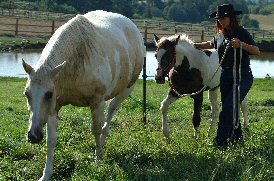 Days 2 and 3 also
run from 9am until 4:30pm and will begin with a theory session and often a
practical session without horses, where (you guessed it), you get to be the
horse!! These simulations seem silly to begin with but as anyone who has tried
them will tell you, they are very eye opening and a great learning tool. They
completely change the way you think about your horse and how you ride and treat
them.
Days 2 and 3 also
run from 9am until 4:30pm and will begin with a theory session and often a
practical session without horses, where (you guessed it), you get to be the
horse!! These simulations seem silly to begin with but as anyone who has tried
them will tell you, they are very eye opening and a great learning tool. They
completely change the way you think about your horse and how you ride and treat
them.
The exercises you then do with you horse for the rest of the
clinic will again depend on the level you are at and the students and horses
that are in the class. As a general idea, here is a list of things you are
likely to learn below.
Level one clinics may include:
Learning
how horses think and why they act like they do.
Learning the seven games on
the 12ft line.
Teaching your horse not to be afraid of you or your
equipment.
Teaching your horse to yield from pressure.
Leading and
saddling safely and calmly.
Learning how to ride with one rein; this includes
lateral flexion, stopping, backing up and being able to control your horses hind
quarters and front quarters independantly. 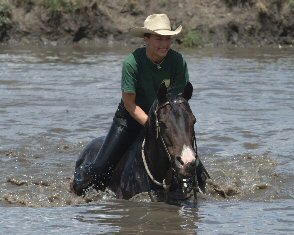
Level
Two clinics may include:
Playing the seven games at a higher level and
on a longer (22ft) line.
Liberty (This means playing with your horse without
any rope) inside and outside of a round coral.
Riding in the halter, the
cherokee bridle and the bridle.
Impulsion patterns.
Drop to trot lead
changes.
Trailer loading.
Two carrot stick riding.
Bareback
riding.
Basic Fluidity concepts.
Level Three clinics may
include:
Playing on the 45ft Line.
Finesse in the bridle.
2 Carrot
stick riding.
Bareback riding.
Riding in a Savvy string.
Advanced
Liberty.
Flying Lead Changes.
Fluidity concepts.
Scheduling
Instructors have both Clinic Coordinators and Hosts. Coordinators are the people
who regularly organize, schedule and run clinics for the Instructor. Some
Instructors have one Coordinator to handle all of their bookings and others have
various coordinators for different areas. Coordinators are usually compensated for their
efforts by receiving 100% of the auditor proceeds as well as a complimentary rider spot if the clinic is filled.
The host is the local contact person (sometimes also the coordinator) and is responsible for all the
on-the-day tasks associated with running a clinic. They are either given a free spot in the clinic to ride or
are compensated for the use of their facility.
If you are interested in coordinating or hosting a clinic anywhere in Canada, you should contact Fawn
Anderson directly for more information and read the section called
Hosting a clinic or lesson. Bookings for 2012 will
begin to be taken in October of 2011.
 Fawn Anderson
Fawn Anderson 